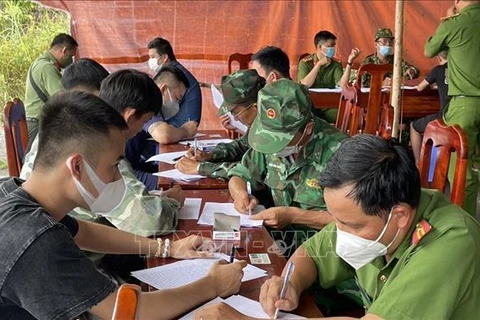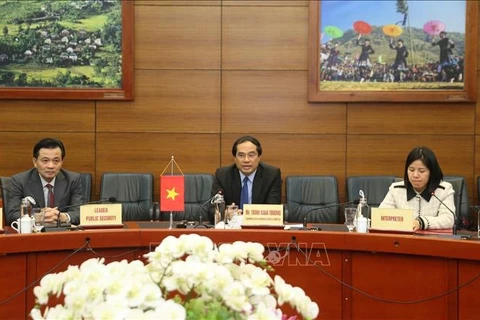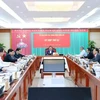Hanoi (VNA) - The UN has identified human trafficking as one of the four most dangerous crimes included in the Global Crime Prevention Programme. Member States also adopted resolution A/RES/68/192 and designated July 30 as the World Day against Trafficking in Persons. This resolution declared that such a day was necessary to “raise awareness of the situation of victims of human trafficking and for the promotion and protection of their rights.”
Vietnam has also designated July 30 as National Anti-Human Trafficking Day, with the aim of mobilising all resources and harnessing the collective strength of the entire political system and people to prevent, combat and ultimately eradicate human trafficking across the country.
Consistent with the viewpoint on facilitating safe, orderly and regular migration, and resolutely combating illegal migration, the Vietnamese government has made the fight against illegal migration and human trafficking as a regular and long-term political task, which should be performed proactively with the close coordination of the international community.
Alarm raised on illegal migration
In August 2022, 42 Vietnamese in Sampeou Poun commune, Kaoh Thom district, Cambodia's Kandal province, fled the casino where they worked and swam across Binh Di River to return to Vietnam.
The group confessed that they had illegally entered Cambodia from Vietnam’s southern border provinces to work at the casino. However, they were forced to work overtime without any payment, so they sought ways to return home illegally.
The case has raised the alarm over the fact that quite a few Vietnamese people have been scammed by job offers and promises of “easy jobs and high salaries” over the past time.
As of September 1, 2022, the Foreign Ministry and Vietnam’s representative agencies in Cambodia have coordinated with the two countries’ authorities to safely repatriate over 600 citizens who had been tricked or lured to Cambodia for illegal work.
Earlier, an incident involving illegal Vietnamese migrants had caused a stir. On October 23, 2019, the bodies of 39 Vietnamese were discovered in the back of a refrigerated lorry at an industrial estate in Grays in Essex, near London. Following the incident, police of the UK, Belgium and many other European nations teamed up in the investigation work.
The case exposed the perilous journey to the UK of the illegal migrants, as well as how criminal gangs profited from the people’s hopes for a better life.
According to the Ministry of Public Security, human trafficking now commonly takes the forms of child adoption, surrogacy, marrying a foreigner, labour export, illegal migration, illegal border crossings, and going abroad to visit relatives and travel.
The ministry said up to 80% of the human trafficking victims have landed in countries with a land border with Vietnam. The rest are trafficked to some other countries by land, air and sea.
Between 2010 and June 2021, Vietnam uncovered nearly 3,500 cases involving 5,000 traffickers and some 7,500 victims in all its 63 cities and provinces.
From inter-sectoral cooperation…
Human trafficking causes particularly serious consequences on human rights and negatively impacts the political security of each country. It also leads to other law violations such as illegal immigration, falsifying documents, prostitution and drug smuggling. Amid the complicated development in crime, the Party, National Assembly, Government, ministries, sectors and localities in Vietnam have taken a wide range of measures against human trafficking.
The Ministry of Labour, Invalids and Social Affairs, the Ministry of Public Security, the Ministry of National Defence, and the Ministry of Foreign Affairs on July 18, 2022 signed an agreement on regulations governing the protection of and support to the victims of human trafficking.
 At the signing ceremony of the regulations between the Ministry of Labour, Invalids and Social Affairs, the Ministry of Public Security, the Ministry of National Defence, and the Ministry of Foreign Affairs. (Photo: VNA)
At the signing ceremony of the regulations between the Ministry of Labour, Invalids and Social Affairs, the Ministry of Public Security, the Ministry of National Defence, and the Ministry of Foreign Affairs. (Photo: VNA) Under the regulations, the sides have jointly set up inter-disciplinary teams to perform the work, settle emerging issues and inspect the implementation of legal provisions in the field.
The four ministries have also jointly built legal documents, projects, programmes and plans on fighting human trafficking.
The regulations clearly state the tasks and responsibilities of each ministry in receiving information and documents on the victims and their relatives, and the implementation of measures on the reception and protection of and support to the victims.
Vietnam has been implementing a programme on anti-human trafficking for 2021 - 2025, with a vision to 2030, with new solutions and tasks to prevent human trafficking in all fields.
The country has also issued documents guiding the enforcement of the 2020 law on Vietnamese working abroad under contracts, along with policies and laws to fight human trafficking and forced labour, assist victims, and protect children in cyber space.
To international cooperation…
During their online meeting in January 2022, Vietnamese Minister of Public Security General To Lam, Cambodian Deputy Prime Minister and Minister of the Interior Samdech Krolahom Sar Kheng and Lao Minister of Public Security General Vilay Lakhamphong agreed that the three countries will enhance cooperation in fighting transnational crimes in all forms, especially drug crime, human trafficking, smuggling, terrorism and high-tech crime.
Vietnam is also making efforts to materialise the Global Compact for Safe, Orderly and Regular Migration in line with the Prime Minister’s Plan dated March 20, 2020, in order to create a transparent migration environment, protect legal rights and interests of migrants, and prevent the risks of human trafficking in international migration activities.
According to the International Labour Organisation (ILO), migrant workers, who play a crucial role in the global economy, are over three times more likely to be in forced labour than non-migrant adult workers.
Therefore, Vietnam has closely cooperated with the international community in preventing forms of human trafficking and illegal migration.
In an interview granted to the Vietnam News Agency (VNA) as part of his recent visit to Vietnam, UK's Migration and Modern Slavery Envoy Andrew Patrick said with the scale and intensive and extensive impacts of the issue, the fight requires joint efforts and reforms globally, including Vietnam.
 The UK’s Migration and Modern Slavery Envoy Andrew Patrick speaks at a meeting during his first trip to Vietnam on March 7, 2023. (Photo by the UK Embassy in Hanoi)
The UK’s Migration and Modern Slavery Envoy Andrew Patrick speaks at a meeting during his first trip to Vietnam on March 7, 2023. (Photo by the UK Embassy in Hanoi) He noted that Vietnam and the UK are working very closely in promoting safe migration and preventing human trafficking.
The two countries share the common goal of encouraging legal migration, and they “have good cooperation” in this regard, he added.
“More broadly, we are looking towards to working with Vietnam when it joins the United Nations Human Rights Council,” the envoy said.
The UK, as a friendly country, together with the International Organisation of Migration (IOM) and others, is helping Vietnam materialise its plan on the implementation of the UN’s Global Compact for Safe, Orderly and Regular Migration, he continued.
Doyen Yun, Head of Projects and Partnerships at the IOM, told the VNA that the UK’s Modern Slavery Fund has helped the organisation and its partners in Vietnam address modern slavery and human trafficking.
It is aligned with priorities set under Vietnam’s programme on human trafficking prevention and combat during 2021-2025, with orientations toward 2030, she added.
Yun highlighted the strong bilateral relationship between the governments of Vietnam and the UK, taking the “Tackling modern slavery in Vietnam” (TMSV) project as an example.
The project is an interagency partnership initiative working with Vietnamese government and local actors to realise their potential to reduce individual and community vulnerabilities to modern slavery including human trafficking through behaviour change communication, strengthened access to justice and victim-centred rehabilitation and reintegration support.
Between 2018 and 2022, the project capacitated 1,782 counter-trafficking actors, with 425 for prevention, 392 for prosecution, and 965 for protection, raised the awareness of over 2.93 million people about human trafficking prevention and safe migration, and helped 1,680 people gain access to local employment opportunities and regular labor migration pathways.
Yun said as Vietnam is a developing country with high human development status, apart from the protection perspective, their activities have been linked with the country’s sustainable development.
Regarding the TMSV, Deputy Chief of the Office of the Ministry of Public Security Colonel Nguyen Hong Nguyen said the project is intended to concretise the content that the Vietnamese government, ministries and agencies have committed in the three areas of prevention, prosecution and protection.
During the 2018-2021 period, thanks to the instruction of the ministry’s leaders, the close, concerted coordination between donors, agencies and localities, especially the drastic engagement of the five targeted cities and provinces of Quang Ninh, Hai Phong, Nghe An, Ha Tinh and Quang Binh, the project has been implemented on schedule and produced significant outcomes in all the three aspects.
Nguyen said that behaviour change campaigns, which aim to prevent vulnerable groups from becoming human trafficking victims, have been carried out concertedly, effectively and substantively in the localities through diverse forms.
The project has also helped accelerate the investigation, prosecution and handling of cases as well as law enforcement in human trafficking prevention and control.
Multiple activities to support, verify and identify victims and others vulnerable to being trafficked have been carried out in line with Vietnamese regulations. Through such activities, many have received relief aid and livelihood assistance.
Empowerment of migrant women
According to the IOM, migration is an integral part of Vietnam’s overall development as reflected in the number of Vietnamese citizens migrating for work, study, marriage, family unification and other purposes both internally and abroad.
Labour migration has become a steady contribution to Vietnam’s socio-economic development. Vietnamese women make up 55,5% of the country migrant population, a survey by the Vietnam Women’s Union showed.
In 2020, there were 3.4 million Vietnamese who migrated (3.3% of total population), among which 1.71 million were women (50.3% of total migrants). While migration has provided many women with opportunities to improve their lives and families, Vietnamese migrant women at the same time face challenges especially in the face of the Fourth Industrial Revolution.
With nearly 80% of working-age women in Vietnam being either low-skilled or unskilled, migrant women workers make up a sizable proportion of the labour force engaged in lower-skilled economic sectors or labour-intensive positions, which account for nearly 74% of all jobs in Vietnam.
 With nearly 80% of working-age women in Vietnam being either low-skilled or unskilled, migrant women workers make up a sizable proportion of the labour force engaged in lower-skilled economic sectors or labour-intensive positions. (Photo: VNA)
With nearly 80% of working-age women in Vietnam being either low-skilled or unskilled, migrant women workers make up a sizable proportion of the labour force engaged in lower-skilled economic sectors or labour-intensive positions. (Photo: VNA) As the Fourth Industrial Revolution is rolled out, automation and technological advancements are forecast to cause a rapid decline in demand for unskilled and low-skilled labour. Up to 86% of workers in Vietnam's textile and footwear industries are at risk of losing their job within the next 15 years. In this context, migrant women workers are among the most affected by the Fourth Industrial Revolution as they account for a large proportion of the low-skilled labour force.
In another aspect, women particularly migrant women looking for jobs have faced growing risks on online spaces. This is because on the one hand, the online platform has become an increasingly popular channel to search for job opportunities. On the other hand, technology enables traffickers to easily recruit victims. Women, especially young women and girls with unskilled or low-skilled, have been targeted by smugglers and traffickers whose criminal operations are transnational.
UN Resident Coordinator in Vietnam Pauline Tamesis said she appreciated the recent efforts by the Vietnamese government to expand vocational training, and raise the nation’s labour conductivity.
Australia's Ambassador to Vietnam Andrew Goledzinowski noted that it is important that “we work together” to ensure that we use technologies to protect migrant women.
US Ambassador to Vietnam Marc E. Knapper said his embassy has worked very closely with the UN, the Vietnamese government and non-governmental organisations in the country to make sure that there are education and other opportunities available, helping individuals to gain the skills they need.
IOM Chief of Mission Park Mihyung emphasised that the IOM is committed and eager to work with all partners to ensure innovation and digital technology as a driver for change, to faster gender equality, women’s empowerment in Vietnam, especially migrant women.
Sharing Park’s view, Tamesis said “Only then, Vietnamese migrant women fully participate in the global economy, equipped with 21st century skills,” calling for joint efforts to enable migrant women to gain digital skills required to become future workforce and protect themselves from cyber violence./.
























